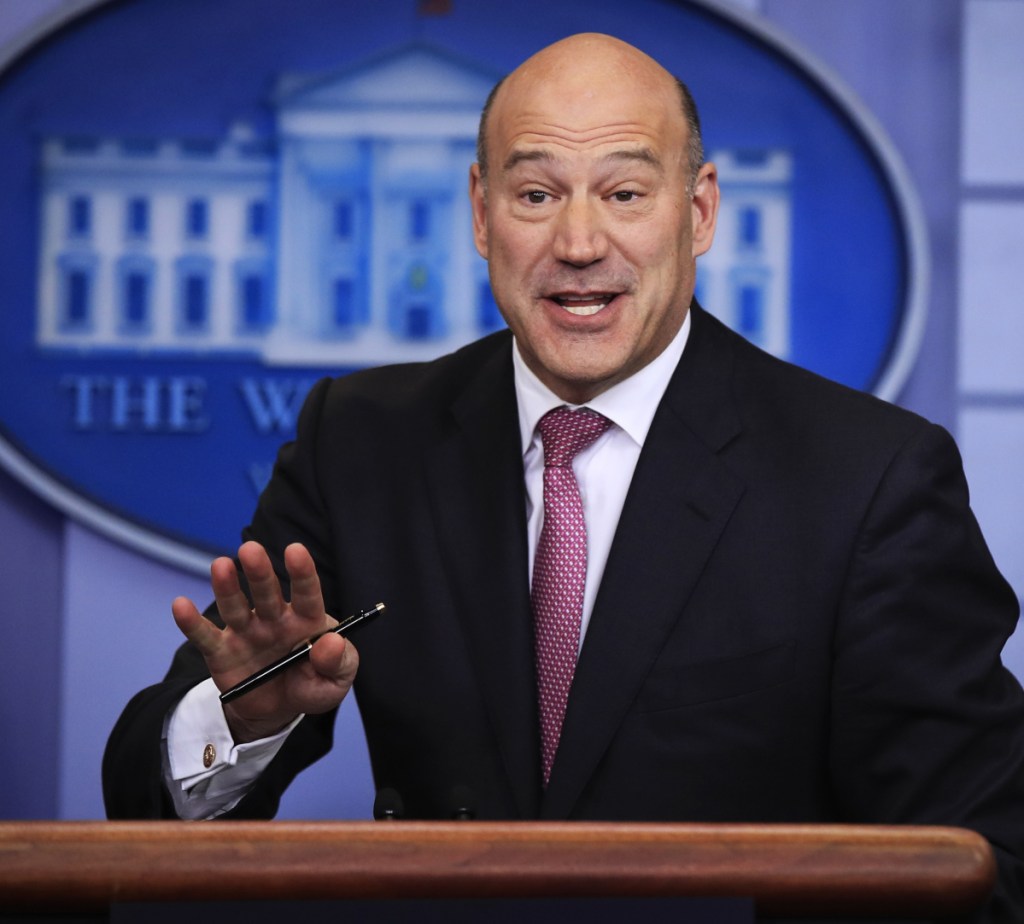NEW YORK — “What does it mean for trade?” That question continued to guide Wall Street Wednesday, leading stocks to a mixed finish after President Trump’s top economic adviser resigned after opposing the administration’s planned tariffs on imports of steel and aluminum.
Stocks fell in the morning as investors reacted to the departure of Gary Cohn, a former Goldman Sachs executive who was seen as a proponent of free trade. The losses deepened after Trump suggested on Twitter that the U.S. may impose penalties on China as part of intellectual property disputes. The Dow Jones industrial average fell as much as 349 points.
Cohn, the director of the National Economic Council, was known to disagree with the tariff plan, which has also drawn criticism from Republicans in Congress as well as from much of corporate America.
“He was seen as a key proponent of free trade to balance some of the other more protectionist-type advisers in the administration,” said Keith Parker, U.S. Equity Strategist for UBS. Cohn was also considered one of the architects of last year’s corporate tax cut.
The market bounced back late in the afternoon after the White House said some countries, including Canada and Mexico, might be granted exemptions to the tariffs. That suggested a lighter touch that won’t affect the global economy and corporate profits as much as a broader tariff would, and wouldn’t result in as much retaliation from other countries.
Industrial companies like Caterpillar and Boeing whipsawed on the news. Technology and health care companies ended higher, while energy companies fell with oil prices.
The Standard & Poor’s 500 index fell as much as 1 percent during the day but finished with a loss of just 1.32 points, less than 0.1 percent, at 2,726.80. The Dow Jones industrial average declined 82.76 points, or 0.3 percent, to 24,801.36.
The Nasdaq composite gained 24.64 points, or 0.3 percent, to 7,396.65. The Russell 2000 index of smaller-company stocks added 12.33 points, or 0.8 percent, to 1,574.53. It’s fared better than the S&P and Dow over the last week as the companies on that index are far more U.S.-focused and would stand to lose less from a flare-up in global trade tensions.
In response to the planned steel and aluminum tariffs, the European Union has proposed tariffs on U.S. exports including motorcycles and bourbon.
While most investors interpreted the departure of Cohn as a loss, Parker said his resignation might keep some of the administration’s protectionist plans in check when combined with criticism from Republicans in Congress and the generally negative stock market reaction.
In other energy trading, wholesale gasoline lost 2 cents to $1.91 a gallon. Heating oil declined 3 cents to $1.87 a gallon. Natural gas rose 3 cents to $2.78 per 1,000 cubic feet.
Bond prices edged higher. The yield on the 10-year Treasury note fell to 2.88 percent from 2.89 percent.
Metals prices gave back some of Tuesday’s gains. Gold fell $7.60 to $1,327.60 an ounce. Silver slid 29 cents, or 1.7 percent, to $16.49 an ounce. Copper lost 2 cents to $3.14 a pound.
Send questions/comments to the editors.



Success. Please wait for the page to reload. If the page does not reload within 5 seconds, please refresh the page.
Enter your email and password to access comments.
Hi, to comment on stories you must . This profile is in addition to your subscription and website login.
Already have a commenting profile? .
Invalid username/password.
Please check your email to confirm and complete your registration.
Only subscribers are eligible to post comments. Please subscribe or login first for digital access. Here’s why.
Use the form below to reset your password. When you've submitted your account email, we will send an email with a reset code.